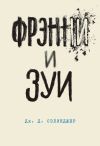Текст книги "Лучшие истории о любви / Best love stories"

Автор книги: И. Маевская
Жанр: Иностранные языки, Наука и Образование
Возрастные ограничения: +16
сообщить о неприемлемом содержимом
Текущая страница: 2 (всего у книги 7 страниц) [доступный отрывок для чтения: 2 страниц]
II
At twenty-three I was entirely unconvinced about anything, except that some people were strong and attractive and could do what they wanted, and others were disgraced. I hoped I was of the former.[35]35
I hoped I was of the former – я надеялся, что принадлежу к первым
[Закрыть] I was sure Ailie was.
I had to revise other ideas about her. In the course of a long discussion with some girl about kissing – in those days people still talked about kissing more than they kissed – I mentioned the fact that Ailie had only kissed two or three men, and only when she thought she was in love. To my considerable disconcertion the girl figuratively just lay on the floor and howled.
“But it’s true,” I assured her, suddenly knowing it wasn’t. “She told me herself.”
“Ailie Calhoun! Oh, my heavens! Why, last year at the Tech spring house party – ”
* * *
This was in September. We were going overseas any week now, and to bring us up to full strength a last batch of officers from the fourth training camp arrived. The fourth camp wasn’t like the first three – the candidates were from the ranks; even from the drafted divisions.[36]36
from the ranks; even from the drafted divisions – из рядовых; даже из призывников
[Закрыть] The addition to our company was Lieutenant Earl Schoen from New Bedford, Massachusetts; as fine a physical specimen as I have ever seen. He was six-foot-three, with black hair, high color and glossy dark-brown eyes. He wasn’t very smart and he was definitely illiterate, yet he was a good officer, high-tempered and commanding, and with that becoming touch of vanity that sits well on the military.
We were doubled up in living quarters and he came into my hut. After a week there was a photograph of some Tarleton girl nailed brutally to the wall.
“She’s no jane or anything like that.[37]37
She’s no jane or anything like that – она не какая-нибудь там девица
[Закрыть] She’s a society girl; goes with all the best people here.”
The following Sunday afternoon I met the lady at a semiprivate swimming pool in the country. When Ailie and I arrived, there was Schoen’s muscular body rippling out of a bathing suit at the far end of the pool.
“Hey, lieutenant!”
When I waved back at him he grinned and winked, jerking his head toward the girl at his side. Then, digging her in the ribs,[38]38
digging her in the ribs – тыча её в бок
[Закрыть] he jerked his head at me. It was a form of introduction.
“Who’s that with Kitty Preston?” Ailie asked, and when I told her she said he looked like a street-car conductor, and pretended to look for her transfer.[39]39
transfer – транзитный билет
[Закрыть]
A moment later he crawled[40]40
he crawled – он подплыл кролем
[Закрыть] powerfully and gracefully down the pool and pulled himself up at our side. I introduced him to Ailie.
“How do you like my girl, lieutenant?” he demanded. “I told you she was all right, didn’t I?” He jerked his head toward Ailie; this time to indicate that his girl and Ailie moved in the same circles. “How about us all having dinner together down at the hotel some night?”
I left them in a moment, amused as I saw Ailie visibly making up her mind that here, anyhow, was not the ideal. But Lieutenant Earl Schoen was not to be dismissed so lightly. He ran his eyes cheerfully and inoffensively over her cute, slight figure, and decided that she would do even better than the other.
While the afternoon passed he remained at her side. Finally Ailie came over to me and whispered, with a laugh: “He’s following me around. He thinks I haven’t paid my carfare.”
She turned quickly. Miss Kitty Preston stood facing us.
“Ailie Calhoun, I didn’t think it of you to go out and deliberately try to take a man away from another girl. I thought you considered yourself above anything like that.”
Miss Preston’s voice was low, but it held that tensity that can be felt farther than it can be heard, and I saw Ailie’s clear lovely eyes glance about in panic. Luckily, Earl himself was ambling cheerfully and innocently toward us.
“If you care for him you certainly oughtn’t to belittle yourself in front of him,” said Ailie, her head high.
It was her acquaintance with the traditional way of behaving against Kitty Preston’s naïve and fierce possessiveness, or if you prefer it, Ailie’s “breeding” against the other’s “commonness.” She turned away.
“Wait a minute, kid!” cried Earl Schoen. “How about your address? Maybe I’d like to give you a ring on the phone.”
She looked at him in a way that should have indicated to Kitty her entire lack of interest.
“I’m very busy at the Red Cross this month,” she said, her voice as cool as her blond hair. “Good-by.”
On the way home she laughed. Her air of having been unintentionally involved in a contemptible business vanished.
“She’ll never hold that young man,” she said. “He wants somebody new.”
“Apparently he wants Ailie Calhoun.”
The idea amused her.
“He could give me his ticket punch[41]41
ticket punch – билетный компостер
[Закрыть] to wear. What fun! If mother ever saw anybody like that come in the house, she’d just lie down and die.”
And to give Ailie credit, it was fully a fortnight before he did come in her house, although he rushed her until she pretended to be annoyed at the next country-club dance.
“He’s the biggest tough, Andy,” she whispered to me. “But he’s so sincere.”
Somehow Mrs. Calhoun didn’t die at his appearance on the threshold. The supposedly ineradicable prejudices of Ailie’s parents were a convenient phenomenon that disappeared at her wish. It was her friends who were astonished. Ailie, always a little above Tarleton, whose admirers had usually been the “nicest” men of the camp – Ailie and Lieutenant Schoen! I grew tired of assuring people that she was merely distracting herself – and indeed every week or so there was someone new – an ensign from Pensacola, an old friend from New Orleans – but always, in between times, there was Earl Schoen.
Orders arrived for an advance party of officers and sergeants to proceed to the port of embarkation and take ship to France. My name was on the list. I had been away for a week and when I got back to camp, Earl Schoen buttonholed me immediately.
“We’re giving a little farewell party in the mess.[42]42
mess – столовая в военном лагере
[Закрыть] Just you and I and Captain Craker and three girls.”
Earl and I were to call for the girls. We picked up Sally Carrol Happer and Nancy Lamar, and went on to Ailie’s house; to be met at the door by the butler with the announcement that she wasn’t home.
“Isn’t home?” Earl repeated blankly. “Where is she?”
“Didn’t leave any information about that; just said she wasn’t home.”
“But this is a darn funny thing!” he exclaimed. He walked around the familiar veranda while the butler waited at the door. Something occurred to him. “Say,” he informed me – “I think she’s sore.[43]43
she’s sore – она обиделась
[Закрыть]”
I waited. He said to the butler, “You tell her I’ve got to speak to her a minute.”
“How am I going to tell her that when she isn’t home?”
Again Earl walked musingly around the porch. Then he nodded several times and said:
“She’s sore at something that happened downtown.”
In a few words he sketched out the matter to me.
“Look here; you wait in the car,” I said. “Maybe I can fix this.” When he left I said to the butler: “Oliver, you tell Miss Ailie I want to see her alone.”
After some argument he bore this message and in a moment returned with a reply:
“Miss Ailie says she doesn’t want to see that other gentleman anymore. She says come in if you like.”
She was in the library. I had expected to see a picture of cool, outraged dignity, but her face was distraught, tumultuous. Her eyes were red-rimmed, as though she had been crying slowly and painfully, for hours.
“Oh, hello, Andy,” she said brokenly. “I haven’t seen you for so long. Has he gone?”
“Now, Ailie – ”
“Now, Ailie!” she cried. “Now, Ailie! He spoke to me, you see. He lifted his hat. He stood there ten feet from me with that horrible – that horrible woman – holding her arm and talking to her, and then when he saw me he raised his hat. Andy, I didn’t know what to do. I had to go in the drug store and ask for a glass of water, and I was so afraid he’d follow in after me that I asked Mr. Rich to let me go out the back way. I never want to see him or hear of him again.”
I talked. I said what one says in such cases. I said it for half an hour. I could not move her. Several times she answered by murmuring something about his not being “sincere,” and for the fourth time I wondered what the word meant to her. Certainly not constancy; it was, I half suspected, some special way she wanted to be regarded.
I got up to go. And then, unbelievably, the automobile horn sounded three times impatiently outside. It was amazing. It said as plainly as if Earl were in the room, “All right; go to the devil then! I’m not going to wait here all night.”
Ailie looked at me horrified. And suddenly a peculiar look came into her face, flickered, and turned into a teary, hysterical smile.
“Isn’t he awful?” she cried in helpless despair. “Isn’t he terrible?”
“Hurry up,” I said quickly. “This is our last night.”
And I can still feel that last night vividly, the candlelight that flickered over the rough tables of the mess, the sad mandolin down the street that kept picking My Indiana Home out of the universal nostalgia of the departing summer. The three girls lost in this mysterious men’s city felt something, too – a bewitched impermanence as though they were on a magic carpet that had lighted on the Southern countryside, and any moment the wind would lift it and waft it away. We toasted ourselves and the South. Then we left our napkins and empty glasses and a little of the past on the table, and hand in hand went out into the moonlight itself and got into a waiting car.
Then Ailie and Earl, Sally and I, two and two in the wide back seat, each couple turned from the other, absorbed and whispering, drove away into the wide, flat darkness.
We drove through pine woods and parked under the broken shadow of a mill where there was the sound of running water and restive birds. The South sang to us – I wonder if they remember. I remember – the cool pale faces, the somnolent amorous eyes and the voices:
“Are you comfortable?”
“Yes; are you?”
“Are you sure you are?”
“Yes.”
Suddenly we knew it was late and there was nothing more. We turned home.
Our detachment started for Camp Mills next day, but I didn’t go to France after all. There wasn’t any more war. I had missed the war. When I came back to Tarleton I tried to get out of the Army, but I had a regular commission and it took most of the winter. But Earl Schoen was one of the first to be demobilized. He wanted to find a good job “while the picking was good.” Ailie was noncommittal, but there was an understanding between them that he’d be back.
By January the camps, which for two years had dominated the little city, were already fading. What life remained centered bitterly about divisional headquarters building, with the disgruntled regular officers who had also missed the war.
And now the young men of Tarleton began drifting back from the ends of the earth – some with Canadian uniforms, some with crutches or empty sleeves.
Just before Christmas, Bill Knowles arrived unexpectedly one day and left the next – either he gave Ailie an ultimatum or she had made up her mind at last. I saw her sometimes when she wasn’t busy with returned heroes from Savannah and Augusta, but I felt like an outmoded survival – and I was. She was waiting for Earl Schoen with such a vast uncertainty that she didn’t like to talk about it. Three days before I got my final discharge he came.
I first happened upon them walking down Market Street together, and I don’t think I’ve ever been so sorry for a couple in my life; though I suppose the same situation was repeating itself in every city where there had been camps. Exteriorly Earl had about everything wrong with him that could be imagined. His hat was green, with a feather; his suit was braided in a grotesque fashion that national advertising and the movies have put an end to. Evidently he had been to his old barber, for his hair bloused neatly on his pink, shaved neck. In these clothes even the natural grace of that magnificent body had departed. At first he boasted of his fine job; it would get them along all right until he could “see some easy money.” But from the moment he came back into Ailie’s world on its own terms he must have known it was hopeless. I don’t know what Ailie said or how much her grief weighed against her stupefaction. She acted quickly – three days after his arrival, Earl and I went North together on the train.
“Well, that’s the end of that,” he said moodily. “She’s a wonderful girl, but too much of a highbrow for me. I guess she’s got to marry some rich guy that’ll give her a great social position. I can’t see that stuck-up sort of thing.” And then, later: “She said to come back and see her in a year, but I’ll never go back. This aristocrat stuff is all right if you got the money for it, but – ”
“But it wasn’t real,” he meant to finish. The provincial society in which he had moved with so much satisfaction for six months already appeared to him as affected and artificial.
“Say, did you see what I saw getting on the train?” he asked me after a while. “Two wonderful girls, all alone. What do you say if we ask them to lunch? I’ll take the one in blue.” Halfway down the car he turned around suddenly. “Say, Andy,” he demanded, frowning; “one thing – how do you suppose she knew I used to command a street car?[44]44
street car – трамвай
[Закрыть] I never told her that.”
“I’ve no idea.”
III
This narrative arrives now at one of the big gaps that stared me in the face when I began. For six years, while I finished at Harvard Law and built commercial aeroplanes, Ailie Calhoun was scarcely more than a name on a Christmas card; something that blew a little in my mind on warm nights when I remembered the magnolia flowers. Occasionally an acquaintance of Army days would ask me, “What became of that blond girl who was so popular?” but I didn’t know. I ran into Nancy Lamar at the Montmartre in New York one evening and learned that Ailie had become engaged to a man in Cincinnati, had gone North to visit his family and then broken it off. She was lovely as ever and there was always an admirer or two. But neither Bill Knowles nor Earl Schoen had ever come back.
And somewhere about that time I heard that Bill Knowles had married a girl he met on a boat.
Oddly enough, a girl seen at twilight in a small Indiana station started me thinking about going South. The girl, in a pink dress, threw her arms about a man who got off our train and hurried him to a waiting car, and I felt a sort of pang. It seemed to me that she was bearing him off into the lost midsummer world of my early twenties, where time had stood still and charming girls still walked slowly along the dusky streets. I suppose that poetry is a Northern man’s dream of the South. But it was months later that I sent off a wire to Ailie, and immediately followed it to Tarleton.
It was July. The Jefferson Hotel seemed strangely shabby and stuffy. I recognized the taxi driver who took me up to Ailie’s house, but his “Sure, I do, lieutenant,” was unconvincing. I was only one of twenty thousand.
It was a curious three days. Ailie’s was still so physically appealing that you wanted to touch the charm that trembled on her lips. No – the change was more profound than that.
At once I saw she had a different line. The modulations of pride, the vocal hints that she knew the secrets of a brighter, finer ante-bellum day, were gone from her voice; there was no time for them now. We went to a party at the house of some young married people, and she was the nervous, glowing center of it. After all, she wasn’t eighteen, and she was as attractive in her rôle of reckless clown as she had ever been in her life.
“Have you heard anything from Earl Schoen?” I asked her the second night, on our way to the country-club dance.
“No.” She was serious for a moment. “I often think of him. He was the – ” She hesitated.
“Go on.”
“I was going to say the man I loved most, but that wouldn’t be true. I never exactly loved him, or I’d have married him anyhow, wouldn’t I?” She looked at me questioningly. “At least I wouldn’t have treated him like that.”
“It was impossible.”
“Of course,” she agreed uncertainly. Her mood changed; she became flippant: “How the Yankees did deceive us poor little Southern girls. Ah, me!”
When we reached the country club she melted like a chameleon into the – to me – unfamiliar crowd. There was a new generation upon the floor, with less dignity than the ones I had known, but none of them were more a part of its lazy, feverish essence than Ailie. Possibly she had realized that in her initial longing to escape from Tarleton’s provincialism she had been walking alone. Just where she lost the battle, waged behind the white pillars of her veranda, I don’t know.
I left her house, as I had so often left it that vanished June, in a mood of vague dissatisfaction. It was hours later, tossing about my bed in the hotel, that I realized what was the matter, what had always been the matter – I was deeply and incurably in love with her. In spite of every incompatibility, she was still, she would always be to me, the most attractive girl I had ever known. I told her so next afternoon. It was one of those hot days I knew so well, and Ailie sat beside me on a couch in the darkened library.
“Oh, no, I couldn’t marry you,” she said, almost frightened; “I don’t love you that way at all. I never did. And you don’t love me. I didn’t mean to tell you now, but next month I’m going to marry another man. We’re not even announcing it, because I’ve done that twice before.” Suddenly it occurred to her that I might be hurt: “Andy, you just had a silly idea, didn’t you? You know I couldn’t ever marry a Northern man.”
“Who is he?” I demanded.
“A man from Savannah.”
“Are you in love with him?”
“Of course I am.” We both smiled. “Of course I am! What are you trying to make me say?”
There were no doubts, as there had been with other men. She couldn’t afford to let herself have doubts. I knew this because she had long ago stopped making any pretensions with me. This very naturalness, I realized, was because she didn’t consider me as an admirer. She couldn’t believe that anyone not taken in to the point of uncritical worship could really love her. That was what she called being “sincere”; she felt most security with men like Canby and Earl Schoen, who were incapable of passing judgments on the ostensibly aristocratic heart.[45]45
incapable of passing judgments on the ostensibly aristocratic heart – неспособные вынести приговор её мнимо аристократическому сердцу
[Закрыть]
“All right,” I said, as if she had asked my permission to marry. “Now, would you do something for me?”
“Anything.”
“Ride out to camp.”
“But there’s nothing left there, honey.”
“I don’t care.”
We walked downtown. The taxi driver in front of the hotel repeated her objection: “Nothing there now, cap.”
“Never mind. Go there anyhow. I want to find where I used to live.”
He obeyed, with professional disgust.
“You won’t find a single thing, darling,” said Ailie. “The contractors took it all down.[46]46
The contractors took it all down – подрядчики всё снесли
[Закрыть]”
We rode slowly along the margin of the fields. It might have been here —
“All right. I want to get out,” I said suddenly.
I left Ailie sitting in the car, looking very beautiful with the warm breeze stirring her long, curly hair.
It might have been here. That would make the company streets down there and the mess, where we dined that night, just over the way.
The taxi driver regarded me indulgently while I stumbled here and there in the knee-deep underbrush, looking for my youth. I tried to find a vaguely familiar clump of trees, but it was growing darker now and I couldn’t be quite sure they were the right trees.
“They’re going to fix up the old race course,[47]47
race course – ипподром
[Закрыть]” Ailie called from the car.
No. Upon consideration they didn’t look like the right trees. All I could be sure of was this place that had once been so full of life and effort was gone, as if it had never existed, and that in another month Ailie would be gone, and the South would be empty for me forever.
Three hours between planes
F. Scott Fitzgerald
There was little chance but Donald was in the mood, healthy and bored, with a sense of tiresome duty done. He was now rewarding himself. Maybe.
When the plane landed he stepped out into a mid-western summer night and headed for the isolated airport. He did not know whether she was alive, or living in this town, or what was her present name. With mounting excitement he looked through the phone book for her father who might be dead too, somewhere in these twenty years.
No. Judge Harmon Holmes – Hillside 3194.
A woman’s amused voice answered his inquiry for Miss Nancy Holmes.
‘Nancy is Mrs Walter Gifford now. Who is this?’
But Donald hung up without answering. He had found out what he wanted to know and had only three hours. He did not remember any Walter Gifford and there was another suspended moment while he scanned the phone book. She might have married out of town.
No. Walter Gifford – Hillside 1191. Blood flowed back into his fingertips.
‘Hello?’
‘Hello. Is Mrs Gifford there – this is an old friend of hers.’
‘This is Mrs Gifford.’
He remembered, or thought he remembered, the funny magic in the voice.
‘This is Donald Plant. I haven’t seen you since I was twelve years old.’
‘Oh-h-h!’ The tone was totally surprised, very polite, but he could distinguish in it neither joy nor certain recognition.
‘ – Donald!’ added the voice. This time there was something more in it than struggling memory.
‘…when did you come back to town?’ Then cordially, ‘Where are you?’
‘I’m out at the airport – for just a few hours.’
‘Well, come up and see me.’
‘Sure you’re not just going to bed?’
‘Heavens, no!’ she exclaimed. ‘I was sitting here – having a highball[48]48
highball – виски с содовой
[Закрыть] by myself. Just tell your taxi man…’
On his way Donald analysed the conversation. His words ‘at the airport’ meant that he had retained his position in the upper bourgeoisie. Nancy’s aloneness might indicate that she had matured into an unattractive woman without friends. Her husband might be either away or in bed. And – because she was always ten years old in his dreams – the highball shocked him. But he thought with a smile – she was very close to thirty.
At the end of a curved drive[49]49
drive – подъездная аллея (к дому)
[Закрыть] he saw a dark-haired little beauty standing against the lighted door, a glass in her hand. Startled by her final materialization, Donald got out of the cab, saying:
‘Mrs Gifford?’
She turned on the porch light and stared at him, wide-eyed and tentative. A smile broke through the puzzled expression.
‘Donald – it is you – we all change so. Oh, this is remarkable!’
As they walked inside, their voices repeated the words ‘all these years’, and Donald felt a sinking in his stomach. In part because of a vision of their last meeting – when she rode past him on a bicycle, cutting him dead[50]50
cutting him dead – совершенно его игнорируя
[Закрыть] – and in part because of fear lest they have nothing to say. It was like a college reunion – but there the failure to find the past was disguised by the hasty lively atmosphere. Horrified, he realized that this might be a long and empty hour.
‘You always were a lovely person. But I’m a little shocked to find you as beautiful as you are,’ he said desperately.
It worked. The immediate recognition of their changed state, the bold compliment, made them interesting strangers instead of fumbling childhood friends.
‘Have a highball?’ she asked. ‘No? Please don’t think I’ve become a secret drinker, but this was a sad night. I expected my husband but he wired he’d be two days longer. He’s very nice, Donald, and very attractive. Rather your type.’ She hesitated, ‘ – and I think he’s interested in someone in New York – and I don’t know.’
‘After seeing you it sounds impossible,’ he assured her. ‘I was married for six years, and there was a time I tortured myself that way. Then one day I just put jealousy out of my life forever. After my wife died I was very glad of that. It left a very rich memory – nothing spoiled or hard to think over.’
She looked at him attentively, then sympathetically as he spoke.
‘I’m very sorry,’ she said. And after a proper moment, ‘You’ve changed a lot. Turn your head. I remember father saying, “That boy has a brain.”’
‘You probably argued against it.’
‘I was impressed. Up to then I thought everybody had a brain. That’s why I still remember it very well.’
‘What else do you remember?’ he asked smiling.
Suddenly Nancy got up and walked quickly a little away.
‘Ah, now,’ she reproached him. ‘That isn’t fair! I suppose I was a naughty girl.’
‘You were not,’ he said stoutly. ‘And I will have a drink now.’
As she poured it, her face still turned from him, he continued:
‘Do you think you were the only little girl who was ever kissed?’
‘Do you like the subject?’ she asked. Her momentary irritation melted and she said: ‘What the hell! We did have fun. Like in the song.’
‘On the sleigh ride.[51]51
sleigh ride – катание на санях
[Закрыть]’
‘Yes – and somebody’s picnic – Trudy James’s. And at Frontenac that summer.’
It was the sleigh ride he remembered most and kissing her cool cheeks in the straw in one corner while she laughed up at the cold white stars. The couple next to them had their backs turned and he kissed her little neck and her ears and never her lips.
‘And the Macks’ party where they played post office and I couldn’t go because I had the mumps,[52]52
I had the mumps – я заболел свинкой
[Закрыть]’ he said.
‘I don’t remember that.’
‘Oh, you were there. And you were kissed and I was crazy with jealousy like I never have been since.’
‘Funny I don’t remember. Maybe I wanted to forget.’
‘But why?’ he asked in amusement. ‘We were two perfectly innocent kids. Nancy, whenever I talked to my wife about the past, I told her you were the girl I loved almost as much as I loved her. But I think I really loved you just as much. When we moved out of town I kept you in my heart.’
‘Were you that much – in love?’
‘My God, yes! I – ’ He suddenly realized that they were standing just two feet from each other, that he was talking as if he loved her in the present, that she was looking up at him with her lips half-parted and a clouded look in her eyes.
‘Go on,’ she said, ‘I’m ashamed to say – I like it. I didn’t know you were so upset then. I thought it was me who was upset.’
‘You!’ he exclaimed. ‘Don’t you remember throwing me over at the drugstore.’ He laughed. ‘You stuck out your tongue at me.’
‘I don’t remember at all. It seemed to me you did the throwing over.’ Her hand fell lightly, almost consolingly on his arm. ‘I’ve got a photograph book upstairs I haven’t looked at for years. I’ll go there and find it.’
Donald sat for five minutes with two thoughts – first the hopeless impossibility of reconciling what different people remembered about the same event – and secondly that in a frightening way Nancy moved him[53]53
Nancy moved him – Нэнси пробуждала в нём чувства
[Закрыть] as a woman as she had moved him as a child. Half an hour had developed an emotion that he had not known since the death of his wife – that he had never hoped to know again.
Side by side on a couch they opened the book between them. Nancy looked at him, smiling and very happy.
‘Oh, this is such fun,’ she said. ‘Such fun that you’re so nice, that you remember me so – beautifully. Let me tell you – I wish I’d known it then! After you’d gone I hated you.’
‘What a pity,’ he said gently.
‘But not now,’ she reassured him, and then impulsively, ‘Kiss and make up – ’
‘…that isn’t being a good wife,’ she said after a minute. ‘I really don’t think I’ve kissed two men since I was married.’
He was excited – but most of all confused. Had he kissed Nancy? or a memory? or this lovely trembly stranger who looked away from him quickly and turned a page of the book?
‘Wait!’ he said. ‘I don’t think I could see a picture for a few seconds.’
‘We won’t do it again. I don’t feel so very calm myself.’
‘Wouldn’t it be awful if we fell in love again?’ said Donald.
‘Stop it!’ She laughed. ‘It’s all over. It was a moment. A moment I’ll have to forget.’
‘Don’t tell your husband.’
‘Why not? Usually I tell him everything.’
‘It’ll hurt him. Don’t ever tell a man such things.’
‘All right I won’t.’
‘Kiss me once more,’ he said, but Nancy had turned a page and was pointing eagerly at a picture.
‘Here’s you,’ she cried. ‘Right away!’
He looked. It was a little boy in shorts standing on a pier with a sailboat in the background.
‘I remember – ’ she laughed triumphantly, ‘ – the very day it was taken. Kitty took it and I stole it from her.’
For a moment Donald failed to recognize himself in the photo – then, bending closer – he became convinced that the boy in the photo wasn’t him.
‘That’s not me,’ he said.
‘Oh yes. It was at Frontenac – the summer we – we used to go to the cave.’
‘What cave? I was only three days in Frontenac.’ Again he looked closely at the slightly yellowed picture. ‘And that isn’t me. That’s Donald Bowers. We did look rather alike.’
Now she was staring at him – leaning back, seeming to lift away from him.
‘But you’re Donald Bowers!’ she exclaimed; her voice rose a little. ‘No, you’re not. You’re Donald Plant.’
‘I told you on the phone.’
She was on her feet – her face faintly horrified.
‘Plant! Bowers! I must be crazy. Or it was that drink? I was mixed up a little when I first saw you. Look here! What have I told you?’
He tried to keep calm as he turned a page of the book.
‘Nothing at all,’ he said. Pictures that did not include him formed and re-formed before his eyes – Frontenac – a cave – Donald Bowers – ‘You threw me over!’
Nancy spoke from the other side of the room.
‘You’ll never tell this story,’ she said. ‘Stories have a way of getting around.[54]54
Stories have a way of getting around – могут пойти слухи
[Закрыть]’
‘There isn’t any story,’ he hesitated. But he thought: so she was a bad little girl.
And now suddenly he was filled with wild jealousy of little Donald Bowers – he who had banished jealousy from his life forever. In the five steps he took across the room he crushed out twenty years and the existence of Walter Gifford.
‘Kiss me again, Nancy,’ he said, sinking to one knee beside her chair, putting his hand upon her shoulder. But Nancy stepped away.
‘You said you had to catch a plane.’
‘It’s nothing. I can miss it. It’s of no importance.’
‘Please go,’ she said in a cool voice. ‘And please try to imagine how I feel.’
‘But you act as if you don’t remember me,’ he cried, ‘ – as if you don’t remember Donald Plant!’
‘I do. I remember you too… But it was all so long ago.’ Her voice grew hard again. ‘The taxi number is Crestwood 8484.’
On his way to the airport Donald shook his head from side to side. He was completely himself now but he could not understand what had happened. Only as the plane took off and its passengers became a different entity from the world below did he draw a parallel from the fact of its flight. For five blinding minutes he had lived like a madman in two worlds at once. He had been a boy of twelve and a man of thirty-two, indissolubly and helplessly commingled.
Внимание! Это не конец книги.
Если начало книги вам понравилось, то полную версию можно приобрести у нашего партнёра - распространителя легального контента. Поддержите автора!Правообладателям!
Данное произведение размещено по согласованию с ООО "ЛитРес" (20% исходного текста). Если размещение книги нарушает чьи-либо права, то сообщите об этом.Читателям!
Оплатили, но не знаете что делать дальше?








































